Brain Fog and Hormones: What’s the Link (and Can It Be Eased Naturally?)
Have you ever walked into a room and forgotten why?
Opened your laptop and stared blankly at the screen? Or found yourself re-reading the same sentence over and over again, unable to absorb the words?
That cloudy, slow, not-quite-there feeling is often referred to as brain fog — and it’s something I hear about from clients all the time. While it’s not a medical diagnosis in itself, brain fog can feel incredibly frustrating, especially when it starts to affect your work, focus, memory, or confidence.
What many people don’t realise is that hormones often play a big role in brain fog — particularly for women at different stages of their reproductive life. Let’s explore what’s really going on, and how you can start to feel clearer and more like yourself again.
What Is Brain Fog?
Brain fog is a term used to describe a cluster of cognitive symptoms, including:
- Poor concentration
- Forgetfulness
- Mental fatigue
- Difficulty finding words
- A general sense of “not feeling sharp”
It can come and go, or linger for longer stretches. For some people, it’s mild and manageable. For others, it can feel like they’re losing a sense of who they were before.
If that sounds familiar — you’re not imagining it, and you’re certainly not alone.
How Hormones Affect Brain Function
Your brain and your hormones are deeply connected. Hormones act like messengers, helping different parts of your body (including your brain) communicate and function properly. When hormones shift — as they naturally do during your menstrual cycle, perimenopause, menopause, or times of stress — your brain can feel the effects.
Some of the key hormonal influences on brain fog include:
1. Oestrogen
Oestrogen plays a vital role in memory, attention, and mood. When levels drop — such as before your period, after childbirth, or during perimenopause — many women notice a dip in mental clarity.
2. Progesterone
Known for its calming, balancing effect, progesterone also influences sleep and stress resilience. Low levels can contribute to poor sleep and anxiety, which in turn impact focus and memory.
3. Cortisol (Stress Hormone)
Chronic stress can dysregulate cortisol, leading to burnout, poor concentration, and cognitive fatigue. It’s a common driver of brain fog, especially in those juggling too much or running on empty.
4. Thyroid Hormones
Thyroid dysfunction, especially underactive thyroid (hypothyroidism), can cause fatigue, sluggish thinking, and brain fog. This is particularly common in women and can be linked to hormonal transitions like postpartum or menopause.
When Brain Fog Shows Up
Hormonal-related brain fog often appears during:
- The luteal phase (just before your period)
- Perimenopause and menopause
- Postpartum and early motherhood
- High-stress periods or burnout
- When sleep is disrupted (which hormones often influence too)
Sometimes it’s subtle. Other times, it feels like a fog has completely rolled in — and you're just trying to make it through the day.
How We Support Brain Fog Naturally
The good news is that there are ways to gently support your hormones, soothe your nervous system, and improve mental clarity — without needing to push harder or “power through.”
Here’s how I work with clients at George Street Wellness Clinic:
Acupuncture
Acupuncture helps regulate the nervous system, reduce stress hormones like cortisol, and support hormonal balance. Many clients report better sleep, clearer thinking, and a greater sense of calm after regular sessions.
EFT (Emotional Freedom Technique)
EFT helps release emotional overwhelm and calm the mind-body system. It’s especially helpful if brain fog is linked to anxiety, overthinking, or unprocessed stress.
Counselling
Talking things through in a safe, gentle space can help lift the emotional load that often contributes to cognitive fatigue — especially during times of hormonal transition.
Reflexology
Reflexology helps reset the nervous system, support hormone function, and improve sleep — all of which play a role in brain clarity.
What You Can Do at Home
Small, consistent changes can make a big difference. Try adding a few of these to your week:
- Support your blood sugar with regular, balanced meals — brain fog often worsens with dips in blood sugar.
- Rest when you need it — even a short lie-down can help reset the nervous system.
- Minimise multitasking — doing one thing at a time (even slowly) helps reduce overwhelm.
- Move your body gently — walking, stretching, or yoga all help shift stagnant energy and boost mental clarity.
- Get outside — daylight and fresh air are simple but powerful brain-support tools.
- Stay hydrated — even mild dehydration can affect memory and focus.
If you’ve been struggling with brain fog, it’s easy to feel like you’re slipping — like your brain isn’t working the way it used to. But more often than not, your body is doing exactly what it needs to do: trying to slow you down so it can restore balance.
At George Street Wellness Clinic in Edinburgh, I help women reconnect with their bodies, understand what’s really going on beneath the surface, and find gentle, holistic support that feels nurturing and empowering — not overwhelming.
If brain fog has been lingering and you’re ready to feel clearer again, please get in touch.












